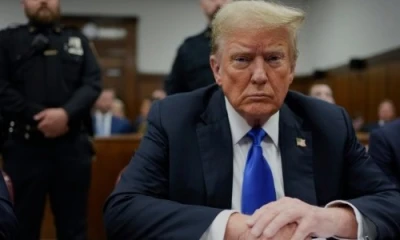Donald Trump has become the first former US President to be convicted of a crime, following a New York jury’s guilty verdict on all charges in his hush money case. This landmark decision comes just months before an election where he could seek to return to the White House. The jury convicted Trump on 34 counts of falsifying business records to hide a payment to silence adult film star Stormy Daniels. Although each count carries a potential four-year prison sentence, Trump is more likely to receive probation.
The 77-year-old Republican, now a convicted felon, was released without bail. Despite his conviction, Trump remains eligible to run for president in the upcoming election and expressed defiance in the face of the verdict.
“I am a very innocent man,” Trump declared to reporters, criticizing the trial as “rigged” and a “disgrace.” He vowed that the “real verdict” would come from the voters.
In response, President Joe Biden’s campaign emphasized that “no one is above the law” and highlighted the ongoing threat Trump poses to democracy.
Judge Juan Merchan scheduled sentencing for July 11, just four days before the Republican National Convention in Milwaukee, where Trump is expected to receive the party’s nomination.
The 12-member jury reached their unanimous decision after over 11 hours of deliberation across two days. Judge Merchan commended the jurors for their diligence in the “difficult and stressful task.”
Throughout the trial, the jurors’ identities were kept confidential; a precaution typically reserved for cases involving violent defendants or organised crime.
Trump also faces additional federal and state charges related to conspiring to overturn the 2020 election results and for retaining classified documents after leaving the White House. However, these more severe cases are unlikely to proceed before the presidential election.
The conviction stems from Trump’s falsification of business records to reimburse his lawyer, Michael Cohen, for a $130,000 payment to Daniels during the 2016 election. The payment aimed to prevent Daniels’ allegations of a sexual encounter with Trump from damaging his campaign against Hillary Clinton.
Daniels, whose real name is Stephanie Clifford, provided detailed testimony about her alleged 2006 encounter with Trump. Prosecutors argued that the hush money and the cover-up were part of a broader scheme to mislead voters about Trump’s conduct.
Cohen, a former aide who turned against Trump, was a key witness in the trial. He hailed the verdict as a significant moment for “accountability and the rule of law.”
Trump, who has consistently denied any sexual relationship with Daniels, did not testify in his defence. His lawyers maintained that the payments were legal.
The trial has undoubtedly impacted Trump’s campaign to unseat Biden, though he has used the media attention to his advantage. Shortly after the verdict, Trump’s campaign released a fundraising appeal titled “I am a political prisoner!” He also announced plans to make a public statement on Friday.
Political analyst Keith Gaddie from Texas Christian University suggested that the conviction’s impact on voters remains uncertain. “In particularly tight races, it can tip things back from one direction to the other,” he said.
As a first-time convict, Trump is likely to receive probation. An appeal is expected, which could take months to resolve. If Trump wins the presidency, he cannot pardon himself for this conviction since it was brought by the state of New York, where only the governor has the authority to grant a pardon.

















